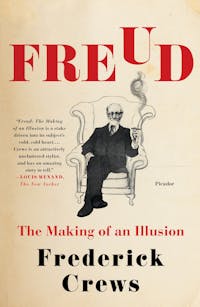Freud
The Making of an Illusion
 Download image
Download image
ISBN10: 1250183626
ISBN13: 9781250183620
Trade Paperback
784 Pages
$29.99
CA$39.99
Since the 1970s, Sigmund Freud’s scientific reputation has been in an accelerating tailspin—but nonetheless the idea persists that some of his contributions were visionary discoveries of lasting value. Now, drawing on rarely consulted archives, Frederick Crews has assembled a great volume of evidence that reveals a surprising new Freud: a man who blundered tragicomically in his dealings with patients, who in fact never cured anyone, who promoted cocaine as a miracle drug capable of curing a wide range of diseases, and who advanced his career through falsifying case histories and betraying the mentors who had helped him to rise. The legend has persisted, Crews shows, thanks to Freud’s fictive self-invention as a master detective of the psyche, and later through a campaign of censorship and falsification conducted by his followers.
A monumental biographical study and a slashing critique, Freud: The Making of an Illusion will stand as the last word on one of the most significant and contested figures of the twentieth century.
Reviews
Praise for Freud
"There is value in Crews’s having synthesized the full roster of Freud’s blunders between 1884 and 1900, the period his book concentrates on . . . He offers a lengthy review of Freud’s harmful embrace of cocaine’s efficacy as a local anesthetic, a mistake compounded by his paid endorsement of its merits for a pharmaceutical company. Crews tells the story of Freud’s apprenticeship with the renowned French neurologist Jean-Martin Charcot, who became known as 'the Napoleon of the névroses,' and whose theories of psychologically traumatic hysteria, though arrived at largely through scientifically dubious hypnosis-based research, heavily influenced Freud’s understanding of the syndrome that loomed large in the history of psychoanalysis. We have extensive recapitulations of the distortions Freud introduced into his early case histories—most famously in the case of Dora. Crews’s exceptional fluency in the source material allows him to integrate complex incidents into an impressively cohesive narrative."—George Prochnik, The New York Times Book Review
“For those who worship Freud, and even those millions who have simply admired his ideas, Crews’s rigorous and captivating detective work will be a bracing challenge.”—Elizabeth Loftus, co-author of The Myth of Repressed Memory
“Frederick Crews has written a riveting, masterful biography of Freud that demolishes forever the myth of the brilliant, heroic conquistador of the human mind. Delving deeply into hitherto suppressed archival material, Crews paints an unforgettable portrait of an utterly incompetent psychotherapist whose ruthless pursuit of wealth and fame led him to disregard the welfare of his patients as well as the scruples of scientific method.”—Richard J. McNally, author of What Is Mental Illness?
“In Freud: The Making of an Illusion, Frederick Crews tells the riveting story of how a troubled, insecure, but supremely ambitious doctor stumbled from one therapeutic fantasy to another before hitting on the one that made him famous. Crews is a master narrator, and he has put his finger on the key factor in Freud's career? The remarkable series of intense, morally fraught, and truly bizarre relationships (collegial, therapeutic, and sexual) that kept Freud going as his theories proved ever resistant to confirmation.”—John Farrell, author of Freud’s Paranoid Quest
“Investigating the famed investigator of the human mind, Frederick Crews reveals Freud as a self-aggrandizing charlatan who cured no one and lacked the most elementary insight into human beings. The Freudian myth—one of the thought-deforming tyrannies of the 20th century—is hereby at an end. This book is as exhilarating as the fall of the Berlin wall.”—Stewart Justman, author of The Psychological Mystique
“In this painstaking study of the life and thought of Sigmund Freud, Frederick Crews reveals just what a huge intellectual Ponzi scheme the elaborate Freudian business represented. This tremendously important book should be read now for the moral it teaches: Beware of teachers who would explain all the mysteries of human nature. They’re unlikely to have your interests in mind.”—Paul McHugh, author of The Mind has Mountains: Reflections on Society and Psychiatry
“Making use of newly available correspondence, and new readings of previously available material, Crews reveals a pattern of misunderstanding, misrepresentation, and mendacity that characterized the Freudian enterprise right from the beginning.”—John F. Kihlstrom, editor of Functional Disorders of Memory
“An elegant and relentless exposé . . . Crews comes to bury Freud, not to praise him, and he does so convincingly. Impressively well-researched, powerfully written, and definitively damning. Crews wields his razor-sharp scalpel on Freud’s slavish followers, in particular, who did not want to see or who willfully redacted the sloppiness of Freud’s research methods in order to ‘idealize him.’”—Kirkus Reviews
Reviews from Goodreads
BOOK EXCERPTS
Read an Excerpt
1
Between Identities
1. PROSPECTS AND BURDENS
When Sigmund—né Schlomo Sigismund—Freud enrolled in the University of Vienna in 1873 at age seventeen, he bore with him the high expectations of a family...


